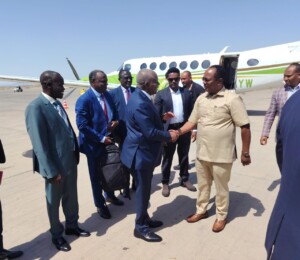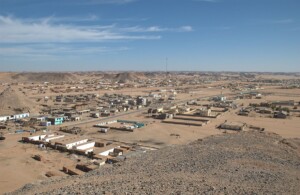Eastern Sudan calls for peaceful coexistence
In a gathering in Khartoum, eastern Sudanese leaders denounced the tribal violence and the growing hate speech in the region following the recent signing of the Sudanese peace agreement and the dismissal of Kassala Governor Saleh Ammar last week.
 Tribal clashes in Port Sudan, August 2020 (Social media)
Tribal clashes in Port Sudan, August 2020 (Social media)
In a gathering in Khartoum, eastern Sudanese leaders denounced the tribal violence and the growing hate speech in the region following the recent signing of the Sudanese peace agreement and the dismissal of Kassala Governor Saleh Ammar last week.
Sheikh Suleiman Betai, head of the well-known Koran schools in Hameshkoreib in Kassala and initiator of the gathering, appealed to the chiefs of the Beni Amer and Hadendawa tribes to listen to the voice of reason and exert efforts to contain the situation in eastern Sudan.
Kassala and Red Sea state have been witnessing violent tribal clashes last week, following the dismissal of Governor Ammar on October 13. Large crowds supporting Ammar, who belongs to the Beni Amer, took to the streets in protest. They blocked main roads and attacked hospitals. Government forces used live ammunition to disperse the protestors. At least 26 people were killed.
The gathering in the Friendship Hall in Khartoum was attended by eastern Sudanese native administration leaders, a number of Sudanese officials, and members of the Sudan Revolutionary Front (SRF) alliance of a number of armed movements, who signed a comprehensive peace agreement with Khartoum on October 3. The peace agreement contains a protocol on eastern Sudan that has been fiercely rejected by the Beja Nazirs Council. The signing as well triggered clashes in Kassala and Red Sea state.
The sheikh said that the two states are living “in a state of anxiety and fear”, while economic activities have stopped and shops have been closed for a week.
He urged the Sudanese government and the RSF rebel alliance “to take the eastern Sudanese issues seriously, and involve its various communities in all levels of power”.
Politics
According to the nazir of the Jemeilab tribe, Mohamed Tahir, “hate speech and demonisation of certain clans have led to an explosion of tribal conflicts in the region”. He praised the role of leaders of the Amarrar clan in calming the situation in Red Sea state.
The Jumilab leader attributed the crisis in the east to the inclusion of politics in the native administration system*, and called for “the removal of any political contents from reconciliation agreements between the tribes”.
He described the timing of the removal of the Kassala governor as “suspicious”, and explained that native administration leaders had requested the prime minister to postpone the dismissal until the ministers and other governors will be exempted according to the provision of the peace agreement.
‘Hate speech and demonisation have led to an explosion of tribal conflicts in the region’ –Jemeilab nazir Mohamed Tahir
Abdallah Deref, representative of the Beni Amer nazir, accused “certain parties” of fuelling hate speech and tribal conflicts in eastern Sudan since last year.
He accused the transitional government of “dealing with eastern issues with laxity”, and of being unable to protect the eastern Sudanese. This year alone, at least 158 people have been killed in intercommunal fighting and 3,650 families have been displaced.
Deref gave Khartoum 72 hours to arrest the government forces accused of killing protesters in Kassala.
No marches
The Resistance Committees of Halfa El Jadeeda and Atbara River in Kassala announced they will not organise new protests, because of the tense situation in the region.
They will also refrain from taking part in the Marches of the Millions planned in Sudan tomorrow in commemoration of the 1964 October Revolution.
In a press statement yesterday, the activists hold the government fully responsible for the current violence in the east triggered by “the reckless decision” to dismiss Governor Ammar.
They called on the government to bring the killers of protestors to justice, and work seriously on a solution to “the strife some parties are trying to ignite”.
They further accused “certain bodies, both internally” of running hate campaigns through social media, and called for “peaceful coexistence between all eastern Sudanese communities”.
* The Native Administration refers to a form of local governance based on tribes or ethnic groups as social units. In Sudan, the British colonial authorities were responsible for the implementation of this type of apparatus. It was thought that the ethnic pattern of decentralised governance was best suited for traditional communities isolated by natural barriers (rivers, mountains, deserts, etc.) which hindered interaction. The system was abolished by President Jaafar Nimeiri in the 1970s. The regime of President Omar Al Bashir revived the Native Administration in the 1990s with the intention to increase its popularity by gaining access to supporters at the grassroots level through their traditional leadership. (Source: Musa Adam Abdul-Jalil, 2015).
Radio Dabanga’s editorial independence means that we can continue to provide factual updates about political developments to Sudanese and international actors, educate people about how to avoid outbreaks of infectious diseases, and provide a window to the world for those in all corners of Sudan. Support Radio Dabanga for as little as €2.50, the equivalent of a cup of coffee.












 and then
and then